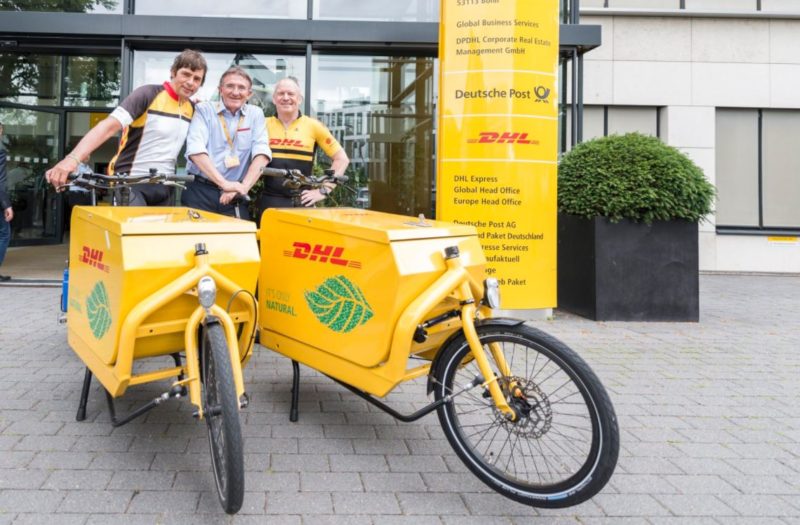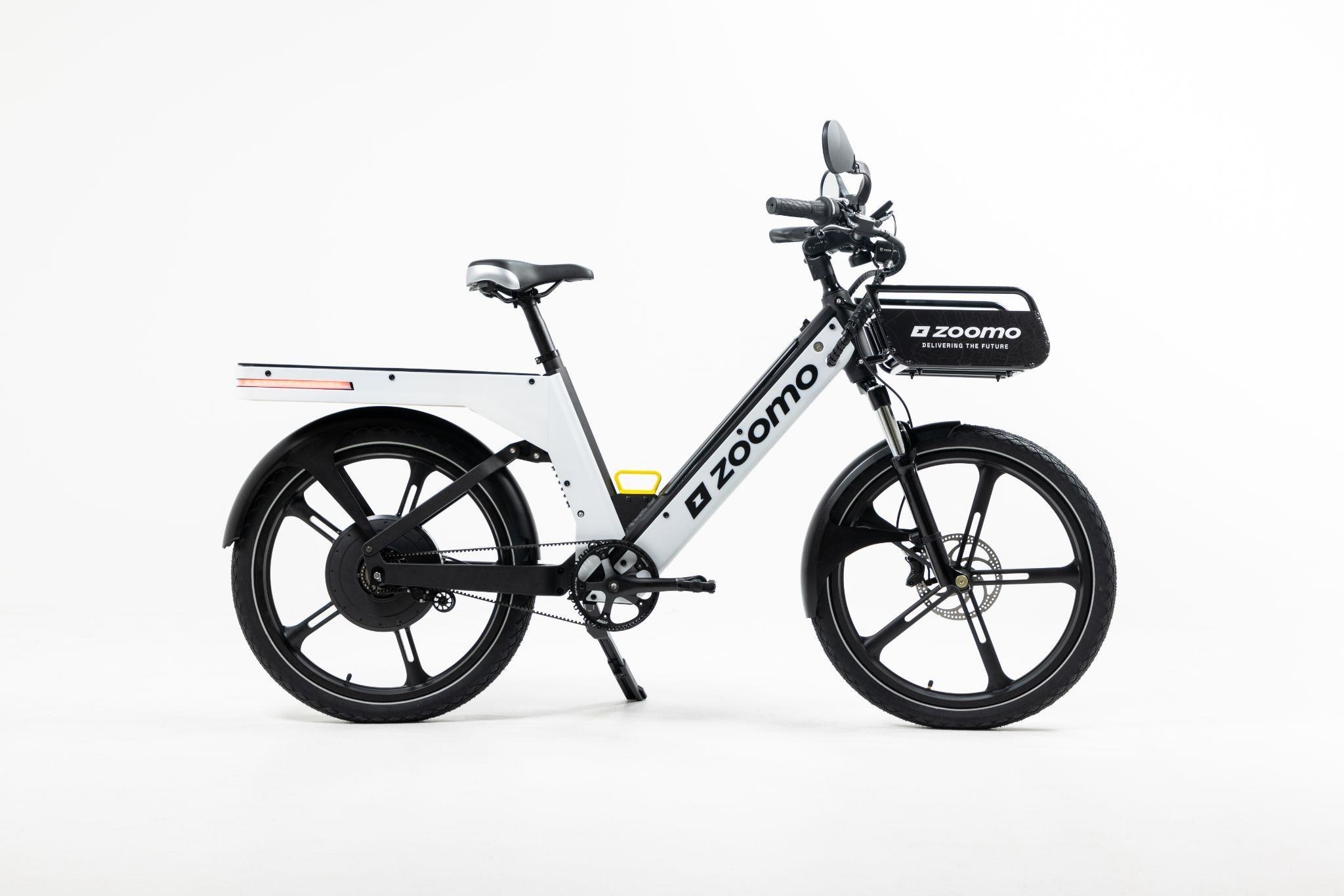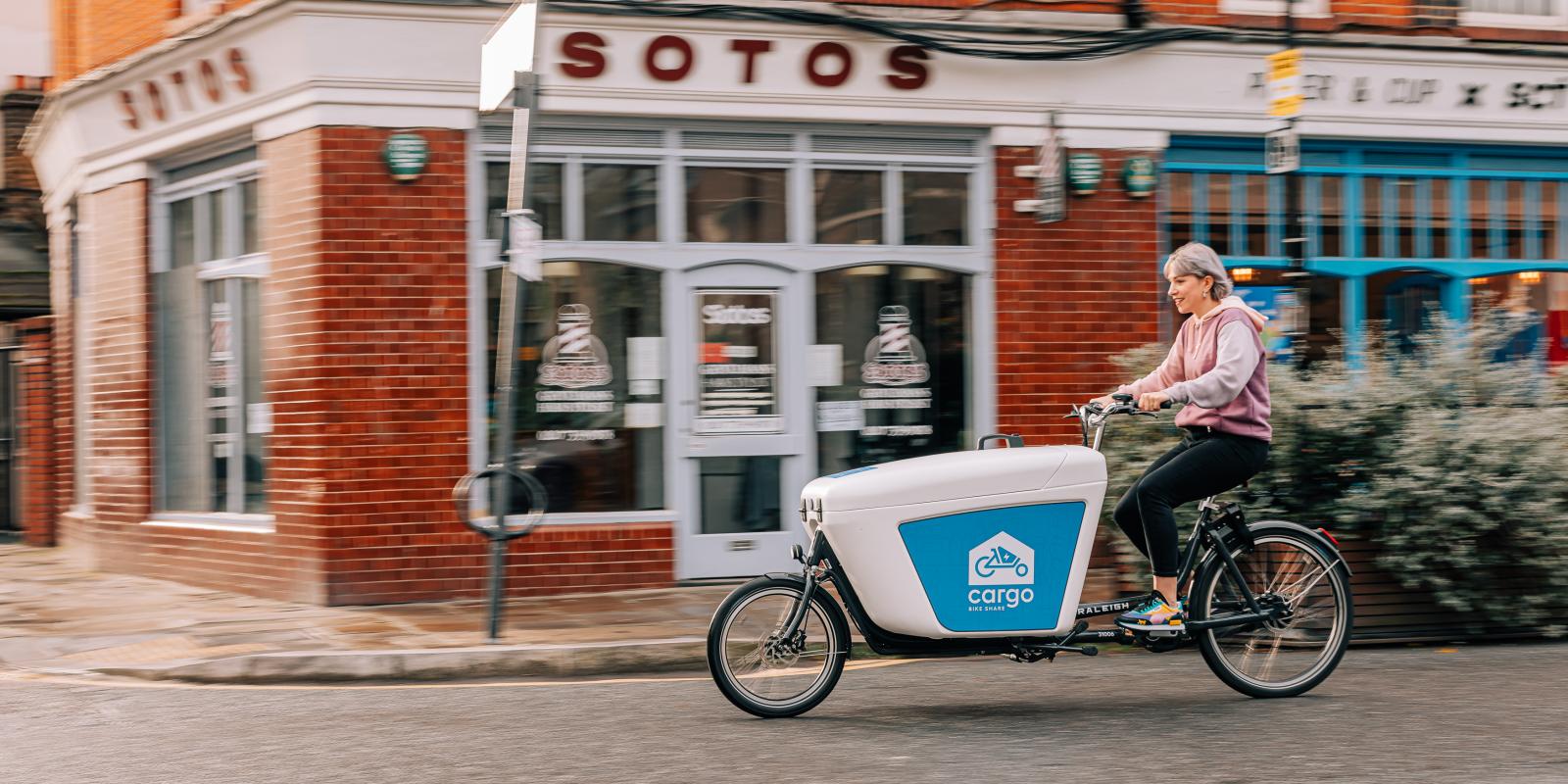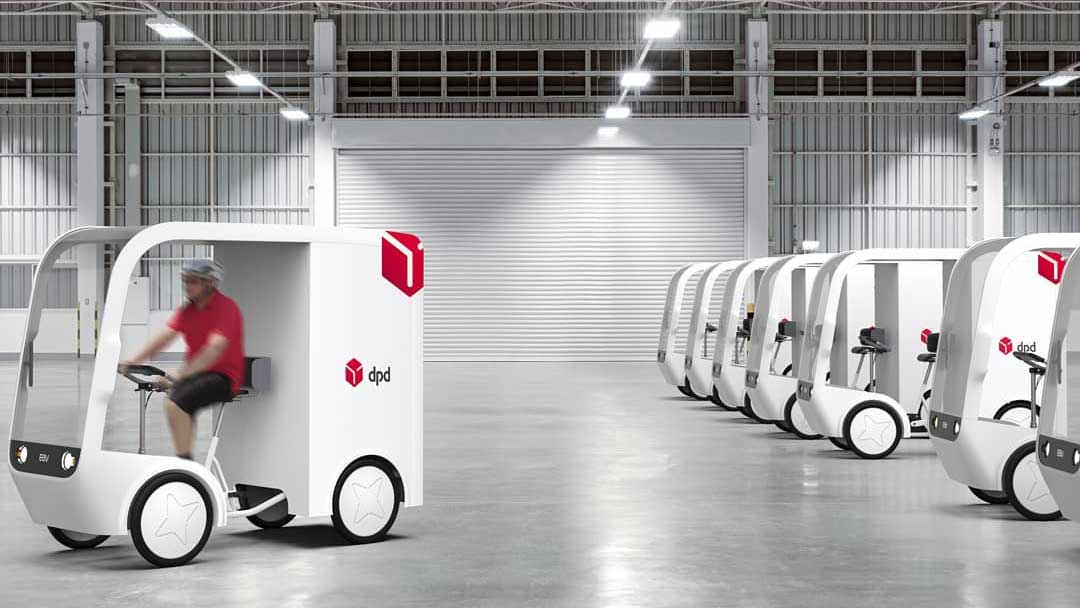UPS, Amazon, and DHL will all participate in a first-time program, focused in Manhattan south of 60th Street.
NEW YORK—Mayor Bill de Blasio today announced that New York City will launch an initiative to encourage freight companies to reduce delivery-related congestion through the use of cargo bicycles. The Commercial Cargo Bike Program, introduced in time for the holiday shopping season, should reduce traffic by bringing an estimated 100 cargo bikes from major delivery companies to the city’s most crowded streets in midtown and downtown Manhattan.
“New Yorkers demand immediate results – whether that’s getting a package delivered or getting around the city,” said Mayor Bill de Blasio. “This is an exciting new program that will help cut congestion on our streets and speed up deliveries, all while reducing vehicle emissions.”
“This new program will help reduce truck traffic on some of the busiest streets in New York City, making our city safer and cutting down on vehicle emissions,” said Deputy Mayor Laura Anglin. “We look forward to working with our partners in the private sector during this holiday season and are eager to see the results of this pilot.”
“DOT is excited to announce this pilot to make freight deliveries in NYC safer and greener by encouraging the use of pedal-assist cargo bikes instead of trucks,” said NYC DOT Commissioner Polly Trottenberg. “With trucks involved in a disproportionately high number of cyclist fatalities in New York City this year, we are especially interested in the safety benefits this pilot can bring to our streets. We thank UPS, DHL and Amazon for their participation and invite other interested freight companies to join and help us make this pilot a success.”
The program’s goal is to better understand whether cargo bicycles can successfully fit into the City’s streetscape. Companies participating will monitor and send data to DOT about the speed, parking, use of bike lanes, and size of the cargo bicycles. DOT will use the information to consider adjustments of its rules regarding cargo bicycle’s speed, parking rates, and size.
The focus area of the program is Manhattan south of 60th Street—the same area to be covered by Central Business District Tolling starting in 2021—with the potential to expand depending on initial results. Cargo bikes are permitted on city streets, but the new program clarifies the operating parameters for cargo bikes used for commercial purposes. DOT is coordinating with NYPD regarding monitoring and enforcement protocols.
DOT has targeted some of the largest operators, including UPS, DHL, and Amazon, but any freight company is allowed and encouraged to participate in the program. Companies participating in DOT’s program must abide by:
- Size limits for sidewalk parking and that walkways be kept clear and in compliance with the Americans with Disabilities Act.
- Requirement for contact info and identification on the cargo bikes.
- Requirement that the bikes not exceed speeds of 12 MPH.
- Safety training sessions for cargo bike operators.
- Requirement that the bikes be stored overnight inside company facilities.
The program will initially be six months and may be extended for additional six-month increments depending on the results of the initiative. Companies interested in participating should contact NYC DOT at Freightmobility@dot.nyc.gov.
The de Blasio Administration has introduced a number of recent initiatives aimed at reducing congestion and improving commutes, especially for bus riders. In 2019, DOT announced expansion of its Off Hours Deliveries program, encouraging businesses to move deliveries to overnight hours. As part of the Administration’s Better Buses plan, DOT has worked with MTA on improvements to several major bus routes, including the creation of the first-ever “busway” along Manhattan’s 14th Street. The NYPD has also announced units dedicated to increased bus-lane enforcement.
“Over 2 million deliveries are made in NYC daily. That’s about a million freight trips per day passing through the five boroughs and that number is only expected to increase,” said City Council Speaker Corey Johnson. “There’s no doubt the rise in deliveries has caused chaos on our streets–but there are plenty of thoughtful solutions out there to make our streets safer and more sustainable. I’m excited to see DOT exploring this new technology which will help bring NYC’s freight and delivery systems into the 21st Century. I look forward to seeing these cargo bikes on the road and working with DOT in the near future to take a comprehensive look at how we manage these deliveries.”
“This is an innovative pilot program that holds great promise for reducing congestion and carbon emissions, while allowing the efficient delivery of goods in Manhattan’s central business district,” said Congress Member Nydia M. Velؘؘázquez. “This is a good step and I look forward to seeing the program grow and expand in the years ahead.”
“More than 1.5 million packages are delivered daily in New York City. That’s great for consumers looking for quick delivery, but it’s had unintended consequences for traffic and pollution,” said State Senator Brad Hoylman. “I was proud to help pass congestion pricing in the State Legislature, which will make Manhattan’s streets less crowded and raise funds for public transit. I’m excited that Mayor de Blasio and the Department of Transportation are beginning this cargo bike program, another innovative tactic to cut down on congestion, and I look forward to reviewing the results.”
“The implementation of congestion pricing in 2021 will make major strides towards breaking our city’s enduring traffic gridlock, but making continued progress must involve a variety of solutions in order to be successful,” said Manhattan Borough President Gale A. Brewer. “I’m pleased that New York City will be joining the growing number of cities embracing cargo bikes as a sustainable and space-efficient delivery option, and look forward to exploring more options to ease traffic in Manhattan.”
“This commercial cargo bike pilot will give us valuable insight into how we can maximize productivity and the use of our streets. Across the City congestion caused by vehicles and trucks has impacted the travel time of all New Yorkers,” said Council Member Ydanis Rodriguez, Chairman of the Transportation Committee. “As the Chair of the Transportation Committee I will continue working with DOT and all other City agencies to ensure we maintain safe roads as we explore new innovative methods to make deliveries.”
“With a record number of packages being delivered this holiday season, we must get innovative in how we deal with distribution to avoid clogging up our streets and sidewalks,” said Council Member Ben Kallos. “When it comes to traffic, there are few things worse than delivery-related congestion. This new plan aims to curb that issue and do it in an environmentally friendly way. Thank you to the Mayor and to the Department of Transportation for working out this plan and coming up with rules and regulations ahead of implementation that prioritize the safety of pedestrians.”
“I often hear from constituents regarding delivery trucks crowding streets,” said Council Member Keith Powers. “This pilot gives the city an opportunity to explore a less disruptive alternative to mitigate the impact of thousands of deliveries a day on New Yorkers’ quality of life. I thank the Mayor and Department of Transportation for this innovative initiative.”
“DHL has set a number of ambitious environmental targets, including achieving net zero emissions from transport activities by 2050 and performing 70% of last-mile deliveries with green vehicles by 2025,” said DHL Express Americas CEO Mike Parra. ”Cargo bicycles will play an important role in hitting both of those targets. The DHL Cubicycle has enjoyed great success in Europe, with each bicycle deployed taking at least one conventional delivery van off the road, helping to relieve congestion and increasing our service levels. We are grateful to the City of New York for enabling this pilot and hope to see the DHL Cubicycle have a similar positive impact on the city’s transport network.”
“In more than 30 cities around the world, UPS has participated in innovative public and private programs to create successful urban delivery solutions – and we know that similar approaches can work in New York City,” said UPS Chief Information and Engineering Officer Juan Perez. “Additionally, UPS has set aggressive sustainability goals that include moving toward an increasingly alternative fuel fleet, and these pedal assist vehicles will complement other emission reduction efforts within our delivery network.”
“Amazon recently made a commitment through The Climate Pledge to reach net zero carbon by 2040 — 10 years ahead of the Paris Agreement,” said Amazon Vice President of Specialty Fulfillment Rebecca Gansert. “We are doing a number things across the company to reduce carbon emissions, and introducing a fleet of e-cargo bikes in New York City is the latest example. We’re starting with 90 bikes and plan to significantly grow that number in the coming months. We appreciate the city of New York and its support of innovative programs to bring more sustainable delivery options to the city.”
“Cargo bikes will help shift freight deliveries away from large, dangerous, polluting trucks, and toward smaller, more appropriate vehicles for a dense urban environment. This means more space on our streets and sidewalks for people, and ultimately a better quality of life for all New Yorkers,” said Danny Harris, executive director of Transportation Alternatives.
“NYC DOT’s new cargo bike program provides a common sense solution to reduce both congestion and pollution,” said Julie Tighe, President of the New York League of Conservation Voters. “Low- and zero-emission freight vehicles like cargo bikes can help fight climate change and make our city’s streets safer for all. They will also complement congestion pricing when it’s implemented in 2021. That’s why we included this type of policy in our New York City Policy Agenda. We thank Commissioner Trottenberg for her bold vision in making our streets clearer and greener. We look forward to working with stakeholders to expand the reimagining of freight travel in the city.”



